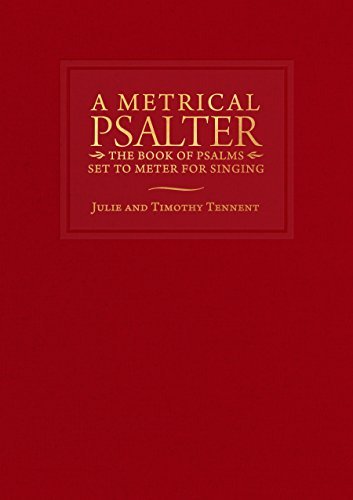A Metrical Psalter: The Book of Psalms Set to Meter for Singing. Julie and Timothy Tennent. 2017. 379 pages. [Source: Bought]
First sentence: The Book of Psalms--it has been loved, cherished, memorized, prayed, and used as a solace and comfort throughout the history of the Christian church and the Hebrew people. Portions of the psalms have been the source for countless anthems, hymns, and choruses. Somehow, we inherently recognize that the psalms were meant to be a means of grace in our lives, and they were meant to be sung.
I've been reading the Psalms monthly for several years. The psalms have become familiar--mostly. When the book of Psalms is your friend, well, it becomes an even more lived-in book. I can never get enough--personally.
Still the idea of SINGING the psalms seemed a little too 'out there.' True, not historically speaking. Traditionally, the psalms have been THE songs of the church. It would be out of place not to be singing the psalms. But I'm going to guess that many contemporary/modern churches don't sing the psalms. And probably even fewer sing the psalms in their own homes in private devotions. Emphasis on SING. I think plenty of Christians do READ the psalms in church and do READ the psalms in their private devotions. I think some/many do memorize psalms as well.
There is a BOOK (which I do have a copy of) and a WEBSITE (which I actually used). The advantage of the website is that there are sound files that play the TUNES on repeat. But perhaps I'm jumping WAY ahead of myself. EACH of the 150 psalms have been written into a metrical psalm. There are a handful of meters--more than just common meter was used. Each psalm has a list of suggested tunes for that meter, that psalm. There's an index of tunes for each meter.
The website doesn't always have functioning music files. (In particular, Nettleton (Come, Thou Fount of Every Blessing) is completely missing. Fortunately, I know every note of that one.) A handful of times, a file will play in one place, but not another. (For example, sometimes Ode to Joy (Joyful, Joyful, We Adore Thee) would play just fine, and other times it would be completely missing. Again, I know every single note of that one.)
Singing through all 150 psalms--there are some tunes that you see VERY frequently. It would be an option to sing that tune over half the time. Other tunes only showed up two or three times tops.
The website is great in that it allows you to use unfamiliar to you tunes. I wish I could say that repeated singing allowed me to memorize tunes if not perfectly...at least well enough to function with the book alone. But sadly, I was still mostly dependent on the website for new-to-me tunes. Again, the tunes I knew, I knew well. New-to-me tunes I was insecure with singing a cappella.
Quotes: In essence, this book of the Bible is a book of 150 separate journeys. We need to take every one of those journeys, and to sing our way through them regularly. The steady practice of singing through all of the psalms is a spiritual discipline that forms us in our Christian pilgrimage. Some may seem more relevant to our present lives than others, but every psalm is laying the tracks for some journey in life that we will eventually encounter, or that we will walk through vicariously with another, or that has been taken by another pilgrim in another time or place with whom we stand in solidarity. Every psalm is teaching us something about the character of God and the posture of God's people, who live amid the tensions of a broken world.


No comments:
Post a Comment